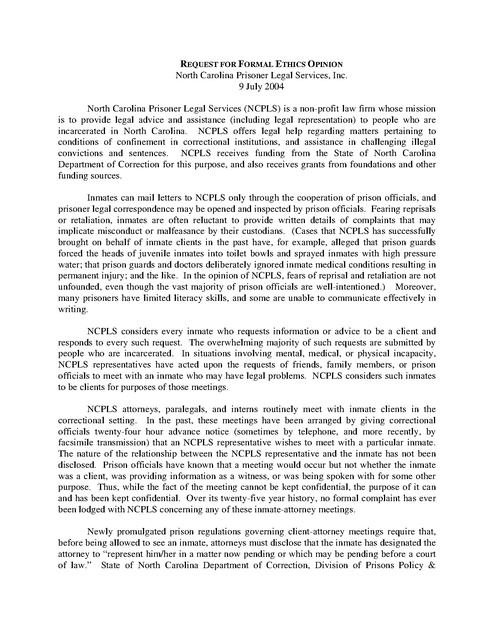Nc Prisoner Legal Services Request for Ethics Opinion Attorney-client Disclosure 2004
Download original document:

Document text

Document text
This text is machine-read, and may contain errors. Check the original document to verify accuracy.
REQUEST FOR FORMAL ETHICS OPINION North Carolina Prisoner Legal Services, Inc. 9 July 2004 North Carolina Prisoner Legal Services (NCPLS) is a non-profit law firm whose mission is to provide legal advice and assistance (including legal representation) to people who are incarcerated in North Carolina. NCPLS offers legal help regarding matters pertaining to conditions of confinement in correctional institutions, and assistance in challenging illegal convictions and sentences. NCPLS receives funding from the State of North Carolina Department of Correction for this purpose, and also receives grants from foundations and other funding sources. Inmates can mail letters to NCPLS only through the cooperation of prison officials, and prisoner legal correspondence may be opened and inspected by prison officials. Fearing reprisals or retaliation, inmates are often reluctant to provide written details of complaints that may implicate misconduct or malfeasance by their custodians. (Cases that NCPLS has successfully brought on behalf of inmate clients in the past have, for example, alleged that prison guards forced the heads of juvenile inmates into toilet bowls and sprayed inmates with high pressure water; that prison guards and doctors deliberately ignored inmate medical conditions resulting in permanent injury; and the like. In the opinion of NCPLS, fears of reprisal and retaliation are not unfounded, even though the vast majority of prison officials are well-intentioned.) Moreover, many prisoners have limited literacy skills, and some are unable to communicate effectively in writing. NCPLS considers every inmate who requests information or advice to be a client and responds to every such request. The overwhelming majority of such requests are submitted by people who are incarcerated. In situations involving mental, medical, or physical incapacity, NCPLS representatives have acted upon the requests of friends, family members, or prison officials to meet with an inmate who may have legal problems. NCPLS considers such inmates to be clients for purposes of those meetings. NCPLS attorneys, paralegals, and interns routinely meet with inmate clients in the correctional setting. In the past, these meetings have been arranged by giving correctional officials twenty-four hour advance notice (sometimes by telephone, and more recently, by facsimile transmission) that an NCPLS representative wishes to meet with a particular inmate. The nature of the relationship between the NCPLS representative and the inmate has not been disclosed. Prison officials have known that a meeting would occur but not whether the inmate was a client, was providing information as a witness, or was being spoken with for some other purpose. Thus, while the fact of the meeting cannot be kept confidential, the purpose of it can and has been kept confidential. Over its twenty-five year history, no formal complaint has ever been lodged with NCPLS concerning any of these inmate-attorney meetings. Newly promulgated prison regulations governing client-attorney meetings require that, before being allowed to see an inmate, attorneys must disclose that the inmate has designated the attorney to “represent him/her in a matter now pending or which may be pending before a court of law.” State of North Carolina Department of Correction, Division of Prisons Policy & Procedures, Chapter D, § .0202(a). In other words, the attorney must specifically disclose that there is a client-attorney relationship and that the meeting concerns representation of the client in ongoing or prospective litigation. The regulation further provides that “[t]he attorney or paralegal assistant is to be admitted to discuss pending legal proceedings only. . . . Solicitation attempts will not be tolerated.” Attorneys who do not represent the inmate (but who may wish to obtain information relevant to a client’s legal claim) must follow “special procedures.” Id., § .0202(c)(copy attached). Following the “special procedures” process will delay the time of the meeting. Even more importantly, these special procedures require that the attorney communicate in writing with the inmate in advance of the meeting, which correspondence is subject to review by prison officials. Query 1. Where a client is in custody of correctional officials and disclosure of the fact that legal counsel has been sought will sometimes be embarrassing or harmful to the client, does Revised Rule 1.6 and the duty to maintain client confidences prohibit NCPLS lawyers from disclosing the nature of the relationship in order to obtain access to the clients for purposes of meeting with them? Query 2. If NCPLS lawyers believe that such disclosure is likely to be embarrassing or harmful to the client, does Revised Rule 1.6 and the duty to maintain client confidences prohibit NCPLS lawyers from disclosing the nature of the relationship in order to obtain access to the clients for purposes of meeting with them? Query 3. Where a meeting between an inmate-client and an attorney is conditioned upon the attorney’s disclosure to the inmate’s custodians of the nature of the client-attorney relationship, are these circumstances so coercive as to render meaningless the inmate-client’s “consent” to such disclosure?





